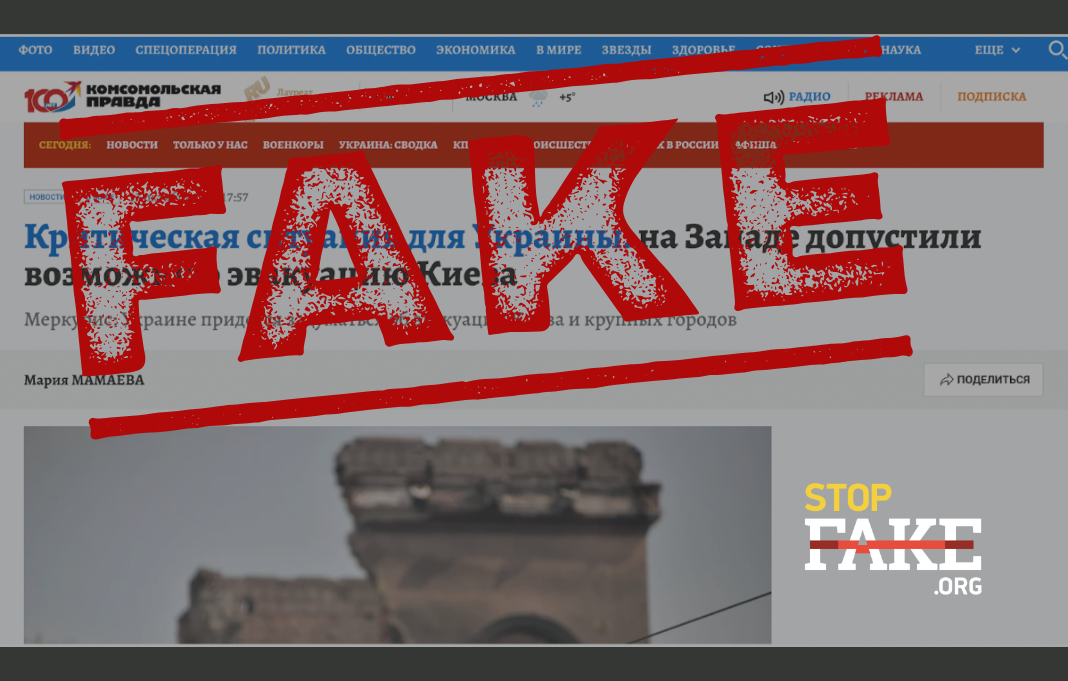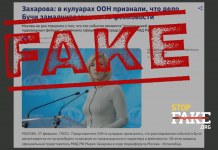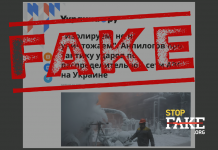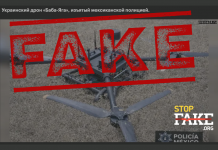Ukraine’s international partners have made no such statements. EU foreign policy chief Kaja Kallas emphasized that European allies remain committed to providing Kyiv with the support needed to navigate the autumn-winter period.
Amid intensified Russian airstrikes targeting Ukraine’s civilian infrastructure, pro-Kremlin media have stepped up information-psychological pressure on the population. Following a familiar pre-winter playbook, propaganda outlets began circulating warnings of a «freezing» Ukraine, claiming Kyiv «will not survive this winter» and falsely asserting that Western allies urged Ukrainian authorities to prepare for the «urgent evacuation» of major cities, including the capital.

No Western ally has issued statements suggesting evacuation of Ukrainian cities. The claim traces back to Kremlin-linked commentator Alexander Mercouris, often presented by Russian media as a «British geopolitical analyst». In fact, Mercouris lost his UK legal license in 2012 for malpractice and has since become a conduit for Russian propaganda. Independent outlets have raised concerns about his financial ties to Moscow, underscoring that he holds no authority to speak on behalf of Ukraine’s partners.
Despite ongoing Russian attacks on Ukraine’s energy infrastructure—escalating annually ahead of the cold season—Kyiv has no plans to evacuate residents as of October 2025. While the country may face a challenging winter, contingency measures for alternative energy supplies have been in place since 2022. During her visit to Kyiv on October 13, EU High Representative for Foreign Affairs and Security Policy Kaja Kallas reaffirmed that European partners will provide full support to help Ukraine navigate the autumn-winter period.
«Russia now seeks to offset battlefield setbacks with terror attacks against civilian and Ukrainian energy infrastructure. The European Union has already mobilised €800 million to support Ukraine this winter. We are working on an extra €100 million for generators, shelters and cold weather gear. As Minister Sybiha and I discussed, Russia has dashed any hope of quick peace, so we are planning for the long haul,» Kallas emphasized.
President Volodymyr Zelensky acknowledged that Russian strikes on Ukraine’s energy and gas infrastructure could force the country to import electricity this winter—a contingency Ukraine has been implementing since 2022 in response to repeated Russian attacks. Zelensky also noted that Kyiv has opened discussions with international partners regarding potential gas imports to ensure energy security.
«We expect electricity challenges. Following one or two attacks, we may need to import electricity, a measure we routinely use in winter—it’s available to us. They are targeting water supply and our broader gas infrastructure. That’s why we’ve begun talks on gas imports. We have our own estimates of demand, but the main issue is funding. Our partners are ready to supply without requiring immediate payment—including Norway, EU countries, and Middle Eastern suppliers we relied on last winter,» Zelensky said on October 13, 2025, during a meeting with Kaja Kallas (see video at 16:33).
Ukraine’s civil protection system maintains contingency plans for a full-scale energy system failure. Since Russia’s initial strikes on the energy sector in 2022, evacuation protocols have been prepared for Kyiv and other major cities. If an emergency were declared in Kyiv or specific districts, the city administration or district authorities could activate designated evacuation points. While the locations of these points are publicly available, officials say there is currently no indication that these plans will need to be implemented.
Since 2022, Kyiv and other Ukrainian cities have also developed a network of Stations of Resilience—facilities where residents can charge devices using generators, access hot water and food, and use communication and internet services during power outages. The locations of these stations are publicly accessible through the Diia app, municipal websites, and official Telegram and Viber chatbots.
StopFake has repeatedly debunked Russian disinformation portraying a «freezing Ukraine». Previous fact-checks include: Manipulation: Lviv Mayor Urges Residents to Stock Up on Firewood Ahead of Winter and Fake: Kyiv Cancels Heating Season Because Of Russia Sanctions.





